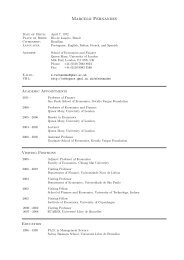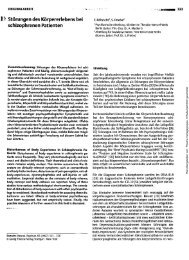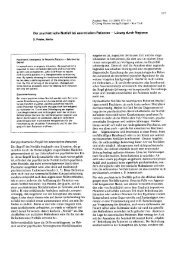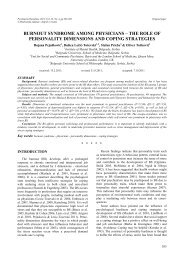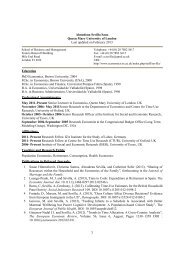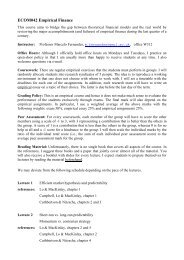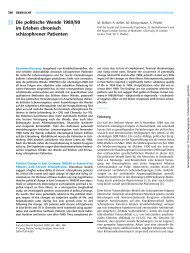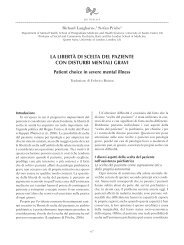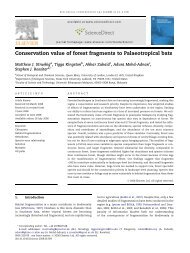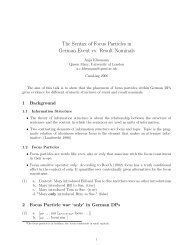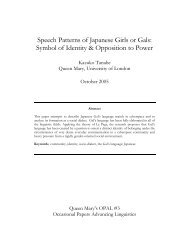Proofs - Personal Webspace for QMUL - Queen Mary, University of ...
Proofs - Personal Webspace for QMUL - Queen Mary, University of ...
Proofs - Personal Webspace for QMUL - Queen Mary, University of ...
You also want an ePaper? Increase the reach of your titles
YUMPU automatically turns print PDFs into web optimized ePapers that Google loves.
S72 S. Bäärnhielm et al. / European Psychiatry 27 (2012) / supplement n°2 / S70-S75<br />
The concept <strong>of</strong> cultural competence has been criticised.<br />
Kleinman and Benson, e.g. [24] point out that it is not defi ned<br />
and operationalized <strong>for</strong> clinical training and best practice.<br />
Further, that a major problem with the idea <strong>of</strong> cultural<br />
competence is that it suggests that culture can be reduced to<br />
a technical skill. The popularity <strong>of</strong> the cultural competence<br />
concept in the USA might be related to the fact that American<br />
literature and research <strong>of</strong>ten refer to broad historically established<br />
ethnic groups such as Afro- Americans, Latinos, etc. In<br />
Europe, globalisation is patterned by a great diversity according<br />
to culture, ethnicity, religious affi liation, language, and social<br />
situation. Accordingly, culture needs to be approached in an<br />
individualised way not stereotyping or falsely ascribing certain<br />
characteristics due to the patients assumed belonging to a<br />
group.<br />
Cultural humility has been proposed as an alternative<br />
concept as it includes self- evaluation [45]. From the colonial<br />
context, with poor health status <strong>for</strong> the Maori population in New<br />
Zealand, the concept <strong>of</strong> cultural safety has been developed and<br />
this includes analysing power imbalance [38]. Another suggested<br />
concept is cultural responsiveness.<br />
3.2. Research and Evaluation results<br />
<strong>of</strong> cross- cultural training<br />
In contrast to the large amount <strong>of</strong> existing cross- cultural<br />
training programmes and cross- cultural training providers,<br />
there is a shortage <strong>of</strong> transparent documented and published<br />
studies <strong>of</strong> such training, especially <strong>for</strong> mental health pr<strong>of</strong>essionals.<br />
Most published studies focus on somatic care and are<br />
anchored in the framework <strong>of</strong> cross- cultural competence. The<br />
existing three reviews on cross- cultural competence training are<br />
based on a total <strong>of</strong> 69 analysed programmes between 1980 and<br />
2010 written in English. There is evidence that cross- cultural<br />
competence training <strong>for</strong> health care providers is a strategy to<br />
improve knowledge, attitudes, and skills [36,7,28]. There is<br />
excellent evidence that the cross- cultural competence training<br />
improves the knowledge <strong>of</strong> health pr<strong>of</strong>essionals and improves<br />
attitudes and skills [7]. There is good evidence <strong>for</strong> a positive<br />
impact on patients’ satisfaction but poor evidence <strong>for</strong> patients’<br />
adherence. The evidence <strong>for</strong> improving patient outcome is not<br />
very compelling. The overall quality <strong>of</strong> competency training with<br />
regard to patient outcome was low to moderate [28]. Evidence<br />
is poor as research is lacking.<br />
A randomized control study <strong>of</strong> training effects on how<br />
Swedish primary care child nurses evaluated their own cultural<br />
competence indicated that training improved the participants’<br />
cultural competence and had a positive impact on their ability<br />
to cope with the demands <strong>of</strong> the work activities [8]. To maintain<br />
the positive effects <strong>of</strong> training Berlin et al. [8] stressed the<br />
importance <strong>of</strong> additional supervision.<br />
There is a shortage <strong>of</strong> research evaluating cross- cultural<br />
competence training <strong>for</strong> mental health care pr<strong>of</strong>essionals.<br />
According to the nine evaluated North American cross- cultural<br />
competence programmes <strong>for</strong> mental health care staff [9] there is<br />
limited evidence <strong>for</strong> their effectiveness, as quantitative measurements<br />
are missing in most <strong>of</strong> these studies. Very little has been<br />
published with regard to content methods.<br />
3.3. Experiences <strong>of</strong> cross- cultural training<br />
in Sweden and Germany<br />
3.3.1. Swedish experiences<br />
In Sweden, cross- cultural mental health training <strong>for</strong> students<br />
and clinical pr<strong>of</strong>essionals has until recently been limited.<br />
In 1997, a public health report by the Swedish Board <strong>of</strong> Health<br />
and Welfare [39] drew attention to the fact that education <strong>for</strong><br />
health pr<strong>of</strong>essionals included little training time <strong>for</strong> issues<br />
related to cultural diversity. Some improvement has occurred<br />
with lectures about Transcultural issues introduced in some<br />
educations, a one week course in Transcultural psychiatry <strong>for</strong><br />
residence in psychiatry at the Karolinska Institutet, and some<br />
training about working with trauma <strong>for</strong> health pr<strong>of</strong>essionals.<br />
Still, the situation means that after basic training many pr<strong>of</strong>essionals<br />
still start working with little or no training in the fi elds<br />
<strong>of</strong> migrant health and cultural diversity. This in turn implies a<br />
great need <strong>for</strong> training <strong>of</strong> clinical pr<strong>of</strong>essionals.<br />
The Transcultural Centre in Stockholm has conducted<br />
some pioneering cross- cultural training <strong>for</strong> mental health and<br />
health pr<strong>of</strong>essionals. An advanced course in “Transcultural<br />
psychiatry” was, <strong>for</strong> several years, supported by the Division <strong>of</strong><br />
Social and Transcultural Psychiatry <strong>of</strong> McGill in Canada, one <strong>of</strong><br />
the important cross- cultural training and research institutions<br />
worldwide. Over the years, cultural perspectives on mental<br />
health care were introduced to a large number <strong>of</strong> practitioners<br />
in Sweden [3]. More and more <strong>of</strong> the programmes organised by<br />
the Transcultural Centre have taken place at local work places.<br />
The planning <strong>of</strong> such in- house training starts with a contact<br />
from the local units followed by an survey <strong>of</strong> the needs and<br />
expectations <strong>of</strong> the health care pr<strong>of</strong>essionals.<br />
Through in- house training new knowledge can be transferred<br />
to whole work places or a group working together. Themes that<br />
pr<strong>of</strong>essionals have <strong>of</strong>ten raised over the years are: diffi culties in<br />
cross- culture encounters; infl uence <strong>of</strong> migration on health and<br />
mental health; cultural variety in expressions <strong>of</strong> distress; challenges<br />
in cross- cultural communication; consequences <strong>of</strong> trauma and<br />
social upheaval; medical ethics, and conventions and regulations<br />
guiding care <strong>for</strong> asylum seekers and undocumented refugees. These<br />
themes give the opportunity to convey new research fi ndings from<br />
cross- cultural psychiatry/psychology, social sciences and other disciplines<br />
to clinicians and to connect theory to daily clinical praxis.<br />
In the training programmes special attention has been given<br />
to the outline <strong>for</strong> Cultural Formulation in DSM- IV [2] as a practical<br />
model to improve cross- cultural diagnosis <strong>of</strong> mental disorders [6].<br />
Psychiatric diagnosis is today a gateway to mental health care<br />
and planning <strong>of</strong> treatment. The Cultural Formulation in DSM- IV<br />
consists <strong>of</strong> five sections: cultural identity <strong>of</strong> the individual;<br />
cultural explanations <strong>of</strong> the individual’s illness; cultural factors<br />
related to psychosocial environment and levels <strong>of</strong> functioning;<br />
cultural elements <strong>of</strong> the relationship between the individual and<br />
the clinician and the overall cultural assessment <strong>for</strong> diagnosis and<br />
care [2]. As a support <strong>for</strong> training and clinical implementation an<br />
interview guide has been used [5,6]. The training in the use <strong>of</strong> the<br />
Cultural Formulation has been the hub around which different<br />
topics related to cross- cultural psychiatry have been introduced<br />
and linked to clinical situations. So far there has been little evaluation<br />
<strong>of</strong> cross- cultural mental health training in Sweden.<br />
<strong>Pro<strong>of</strong>s</strong>



